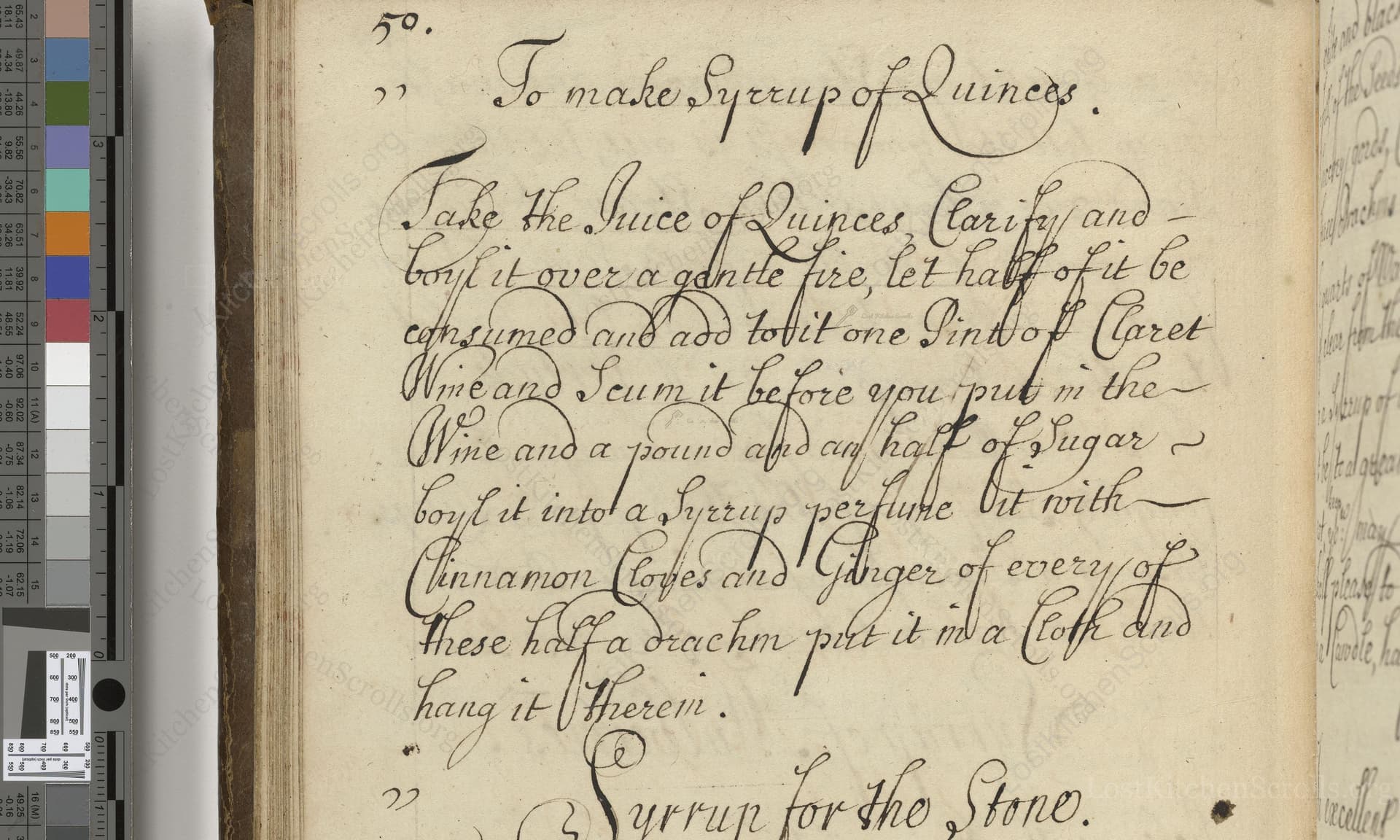To Make Syrrup Of Quincess
From the treasured pages of Cordial waters simple waters and syrrups
Unknown Author

To Make Syrrup Of Quincess
"Take the Juice of Quincess, Clarify and - boil it over a gentle fire, let half of it be consumed and add to it one Pint of Claret Wine and Scum it before you put in the Wine and a pound and an half of Sugar - boil it into a Syrrup perfume it with Cinnamon Cloves and Ginger of every of these half a drachm put it in a Cloath and hang it therem."
Note on the Original Text
The recipe uses period-spelling ('Syrrup', 'Quincess', 'therem') and a simple, sequential set of instructions, as was common in domestic manuscripts. Measurements such as 'pint' and 'pound and half' are customary for the 17th century; a pint was likely close to an imperial pint (~568 ml), but actual volume could vary. The recipe instructs on techniques like clarifying, skimming, and making a spice sachet, all in concise prose without detailed time or temperature indications, trusting the cook's experience. Some words ('clarify,' 'scum') reflect culinary practices that helped produce a clear, fragrant syrup.

Title
Cordial waters simple waters and syrrups (1680)
You can also click the book image above to peruse the original tome
Writer
Unknown
Era
1680
Publisher
Unknown
Background
Step back to the kitchens of the 17th century with this delightful collection of time-honored recipes and culinary secrets, sure to enchant any lover of historical gastronomy.
Kindly made available by
Folger Shakespeare Library
This recipe for Syrrup of Quincess comes from a late 17th-century English manuscript (V.a.669, 1680). At the time, syrups were a favored way of preserving fruit juices and adding both medicinal and culinary value to fruits like quince, which was prized for its tart flavor and rich aroma. Recipes such as this would have been used both in kitchens and by apothecaries, and the inclusion of wine and spices reflects the era's tastes and preservation techniques.

Historically, this syrup would have been prepared in a heavy cauldron or brass kettle over a hearth or moderate fire. Skimming would have been done with a large spoon or skimmer, and juices clarified with linen cloths. A muslin or fine cloth bag was used to hang in spices, and syrups were bottled and stored in glass or ceramic vessels, corked tightly.
Prep Time
20 mins
Cook Time
1 hr
Servings
20
We've done our best to adapt this historical recipe for modern kitchens, but some details may still need refinement. We warmly welcome feedback from fellow cooks and culinary historians — your insights support the entire community!
Ingredients
- 1 quart quince juice (from about 5 1/2–6 1/2 pounds fresh quinces)
- 1 pint claret wine (dry red wine, Bordeaux style)
- 3 1/2 cups granulated sugar
- 1/2 teaspoon cinnamon (whole stick, preferably)
- 1/2 teaspoon cloves (whole)
- 1/2 teaspoon ginger (sliced fresh or dried pieces)
- Muslin or cheesecloth for spices
Instructions
- Begin by juicing fresh quinces, aiming for about 1 quart of juice.
- Pour the juice into a heavy-bottomed pot and gently simmer it over low heat, skimming off any foam, until the liquid is reduced by half (to about 1 pint).
- Remove the pot from the heat, and add 1 pint of a dry red wine (such as a modern Claret style or Bordeaux).
- Skim again if necessary, then add 3 1/2 cups of granulated sugar.
- Return the pot to the heat and simmer gently, stirring, until the sugar has dissolved and the syrup has thickened slightly.
- To finish, enclose 1/2 teaspoon each of whole cinnamon, cloves, and ginger in a small piece of clean muslin or cheesecloth, tie it closed, and hang it in the syrup as it cools to infuse the perfume.
- Remove the spice bag before bottling the syrup.
Estimated Calories
100 per serving
Cooking Estimates
It takes about 20 minutes to prepare the ingredients, and about 1 hour to reduce the quince juice and simmer the syrup. The recipe makes about 1 liter of syrup, which can be divided into about 20 servings of 50 ml each. Each serving has about 100 calories.
As noted above, we have made our best effort to translate and adapt this historical recipe for modern kitchens, taking into account ingredients nowadays, cooking techniques, measurements, and so on. However, historical recipes often contain assumptions that require interpretation.
We'd love for anyone to help improve these adaptations. Community contributions are highly welcome. If you have suggestions, corrections, or cooking tips based on your experience with this recipe, please share them below.
Join the Discussion
Rate This Recipe
Dietary Preference
Main Ingredients
Culinary Technique

Den Bockfisch In Einer Fleisch Suppen Zu Kochen
This recipe hails from a German manuscript cookbook compiled in 1696, a time whe...

Die Grieß Nudlen Zumachen
This recipe comes from a rather mysterious manuscript cookbook, penned anonymous...

Ein Boudain
This recipe comes from an anonymous German-language manuscript cookbook from 169...

Ein Gesaltzen Citroni
This recipe, dating from 1696, comes from an extensive anonymous German cookbook...
Browse our complete collection of time-honored recipes



